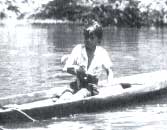THAILAND
 Laboratory analyses of water taken from a creek passing through Thung Yai Naresuan Wildlife Sanctuary show "startling and scary' levels of lead contamination, says Sirithan Pairojboriboon, director-general, Thailand Pollution Control Department.
Laboratory analyses of water taken from a creek passing through Thung Yai Naresuan Wildlife Sanctuary show "startling and scary' levels of lead contamination, says Sirithan Pairojboriboon, director-general, Thailand Pollution Control Department.
The contamination, measured at 0.0058 milligram per litre (mg/l) upstream, increased by 18 times as the creek passed the mineral separation plant of Klity mine. At seven kilometre (km) from the mine, the contamination level reached 20 times higher than the upstream reading and soared to 94 times once it flowed by a Karen village, 12 km downstream.
Pairojboriboon says it was the highest level of lead contamination ever found in Thailand. The water was only safe for watering plants but not those with roots such as onion, cassava and garlic,' he says. The acceptable standard for lead in water is 0.05 mg/l. This indicates that the creek was virtually pollution-free before the mining began. He says that the results was confirmed after the analysis of two sets of samplings.
Lead content found in the sediment from the stream bed was even more startling, containing 163 times more than 402 mg/kg in water upstream. Due to the rugged and zigzagging stream bed, the figure climbed to 33,366 mg/kg, 83 times higher than at a point where the creek flows to the village.
According to Pairojboriboon, the mine operator, Phol and Son Co, has agreed to be fully responsible for everything, including the clean-up. "It has admitted its wrongdoing,' he says. Dredging was the best method for getting rid of the metal, believes Pairojboriboon. Sprinkling chemical powder to treat the water was also considered but was not found to be feasible.
The director-general expresses doubts over the current waste water treatment method employed by the mine in which the water is allowed to stand in a retention pond until the heavy metal falls to the bottom. The topography creates many sinkholes through which the discharge could seep and resurface at some other place several km away, Pairojboriboon says.
Related Content
- Integrating co-benefits into Nationally Determined Contributions, climate policies and air pollution policies in Asia
- Fossil fuel subsidies and GHG emissions: firm-level empirical evidence from developing Asia
- International labour migration in a changing climate: insights from Malaysia and Thailand
- Thailand’s clean electricity transition: how accelerated deployment of renewables can help achieve Thailand’s climate targets
- Modeling traffic congestion effects on air pollutants
- Gender, health and air pollution
